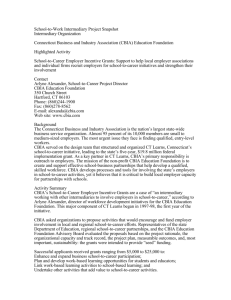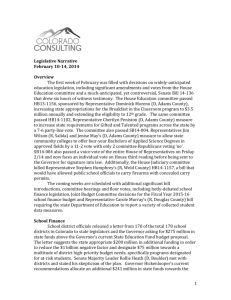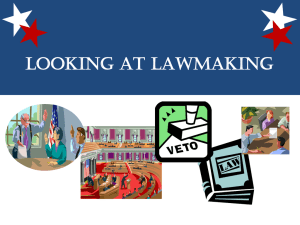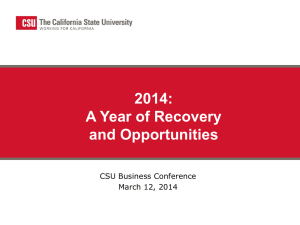End-of-Session Wrap Up Part 2
advertisement
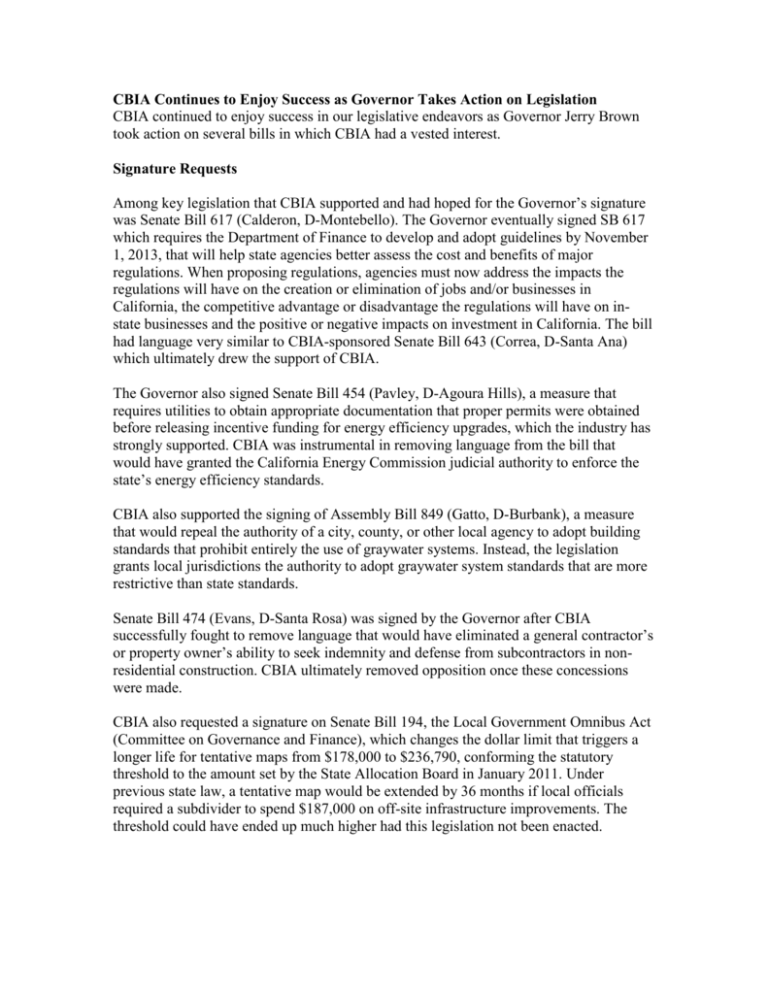
CBIA Continues to Enjoy Success as Governor Takes Action on Legislation CBIA continued to enjoy success in our legislative endeavors as Governor Jerry Brown took action on several bills in which CBIA had a vested interest. Signature Requests Among key legislation that CBIA supported and had hoped for the Governor’s signature was Senate Bill 617 (Calderon, D-Montebello). The Governor eventually signed SB 617 which requires the Department of Finance to develop and adopt guidelines by November 1, 2013, that will help state agencies better assess the cost and benefits of major regulations. When proposing regulations, agencies must now address the impacts the regulations will have on the creation or elimination of jobs and/or businesses in California, the competitive advantage or disadvantage the regulations will have on instate businesses and the positive or negative impacts on investment in California. The bill had language very similar to CBIA-sponsored Senate Bill 643 (Correa, D-Santa Ana) which ultimately drew the support of CBIA. The Governor also signed Senate Bill 454 (Pavley, D-Agoura Hills), a measure that requires utilities to obtain appropriate documentation that proper permits were obtained before releasing incentive funding for energy efficiency upgrades, which the industry has strongly supported. CBIA was instrumental in removing language from the bill that would have granted the California Energy Commission judicial authority to enforce the state’s energy efficiency standards. CBIA also supported the signing of Assembly Bill 849 (Gatto, D-Burbank), a measure that would repeal the authority of a city, county, or other local agency to adopt building standards that prohibit entirely the use of graywater systems. Instead, the legislation grants local jurisdictions the authority to adopt graywater system standards that are more restrictive than state standards. Senate Bill 474 (Evans, D-Santa Rosa) was signed by the Governor after CBIA successfully fought to remove language that would have eliminated a general contractor’s or property owner’s ability to seek indemnity and defense from subcontractors in nonresidential construction. CBIA ultimately removed opposition once these concessions were made. CBIA also requested a signature on Senate Bill 194, the Local Government Omnibus Act (Committee on Governance and Finance), which changes the dollar limit that triggers a longer life for tentative maps from $178,000 to $236,790, conforming the statutory threshold to the amount set by the State Allocation Board in January 2011. Under previous state law, a tentative map would be extended by 36 months if local officials required a subdivider to spend $187,000 on off-site infrastructure improvements. The threshold could have ended up much higher had this legislation not been enacted. The Governor also signed Senate Bill 618 (Wolk, D-Davis), a measure that require the county assessor to consider, when valuing real property for property taxation purposes, solar-use easements. CBIA requested a signature on this measure. Veto Requests In addition to the signature requests, CBIA also sought vetoes on a number of bills. The Governor vetoed Assembly Bill 275 (Solorio, D-Santa Ana), the Rainwater Capture Act of 2011, which would have allowed local governments to charge for permits for rainwater capture systems that would be connected to the public water system. CBIA was also part of a broad coalition seeking a veto of Assembly Bill 767 (Perez, DLos Angeles) which would establish a State Capitol Sustainability Task Force. The coalition was opposed because the bill mandated the state use a private-sector building standards program to the exclusion of California’s own groundbreaking mandatory standards, the California Green Building Code (CALGreen). Lastly, CBIA was part of a coalition seeking a veto of Senate Bill 469 (Vargas, D-San Diego), a measure that would have added significant burdens to retailers wishing to locate new stores or remodel existing stores which sell groceries in California. Among other aspects, the bill would have required redundant economic impact studies already required under CEQA. The CBIA Board of Directors has adopted legislative and regulatory priorities for 2012, which CBIA will update members on in the coming weeks. For more information, contact your Governmental Affairs Team: Richard Lyon Jason Bryant Silvio Ferrari Bob Raymer Nick Cammarota Steve Cruz Cassie Gilson Frank de Lima Cliff Moriyama Christy Sinclair






